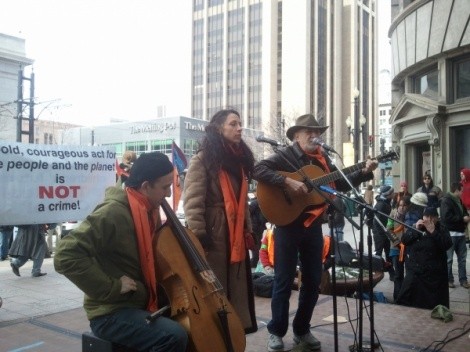
Peter, Paul & Mary (PP&M), the folk-singing trio from Greenwich Village, performed in Salt Lake City in late 1962 or early ’63, my senior year at Highland High School. Although the exact date is elusive, I remember the night well enough because it was my first time in a concert audience. The venue was the cavernous Terrace Ballroom at 464 S. Main.
Peter and Paul wore dark suits and ties. The halo of straight, blond hair is all I recall about Mary. My wardrobe was limited to one suit, a banker’s-gray sharkskin, one my mother bought at ZCMI, and I was wearing it that night. After a couple of warm-up songs, Peter instructed all the boys to take off their jackets and sport coats. “Now,” he continued, “turn them inside out and then lay them on the floor so the girls can sit down without getting their dresses dirty.” So we sat on the floor with our girlfriends, and when PP&M sang “Blowin’ in the Wind,” we joined in solemnly on the chorus.
Many years later, at a fundraiser for Senator John Kerry at the Boston Opera House, I was lucky enough to be part of another memorable PP&M sing-along. After singing for almost two hours, the trio retired from the stage. Insistent applause brought them back twice. On the second encore, as they strummed the opening chords of “Puff, the Magic Dragon,” the audience spontaneously began to sing. From that point on, neither Peter, Paul nor Mary uttered a syllable. Nostalgic, misty-eyed Baby Boomers sang the entire song.
Peter was back in Salt Lake City in late February to participate in the “peaceful uprising” for environmental activist Tim DeChristopher. I made it a point to arrive early for Peter’s midnight vigil at the First Unitarian Church. As the pews filled, I assessed the gathering crowd. No one was in a coat and tie. The majority was young.
By the time Peter walked in at 1 a.m., the pews were packed shoulder to shoulder, and four videographers maneuvered the aisles. Peter wore Levis and a T-shirt. The Van Dyke beard had gone gray. His arms were soft and chalky-white—like mine. Without raising his voice, he took command of the high-ceilinged room. He told stories and sang songs. The crowd listened raptly as he described being on the steps of the Lincoln Memorial with Martin Luther King Jr. when he gave the “I Have a Dream” speech. Then he talked about being arrested at a protest rally with his 14-year-old daughter. The audience clapped their hands as he sang, “Have you been to jail for justice? Then you’re a friend of mine.” The normally staid sanctuary was transformed into a tent revival meeting, with Brother Peter exhorting the faithful to follow him and DeChristopher on an “anti-greed march.” The audience cheered. They held each other’s hands and sang “We Shall Overcome.” It was a good, warm place to be on a cold February night.
A Unitarian church is the ideal place for pondering civil disobedience. My thoughts turned to an anecdote about Ralph Waldo Emerson, a Unitarian minister, and his friend, Henry David Thoreau. Emerson visited the jail where Thoreau had been incarcerated for refusing to pay taxes. “Why are you in there, Henry?” Emerson asked. “Why aren’t you in here?” Thoreau replied.
DeChristopher is our Thoreau, and by the end of the vigil, much had been said about his willingness to put himself at risk for the sake of principle. To do so is such a rare occurrence in America nowadays; I can’t help but admire him. During the Vietnam War, plenty of guys decried the “illegal and immoral” war, but damned few followed their beliefs into prison or into Canada.
It is now 40 years since folk songs were on the jukebox, three plays for a quarter. Shakey’s is gone; the Terrace Ballroom, too, razed in 1981. Mary is dead. On the other hand, we are blessed with the Civil Rights Act of 1964, the Voting Rights Act of 1965, the end of apartheid in South Africa and peace in Vietnam. Do PP&M deserve any credit? I believe so. But I suppose you could argue that the trio’s prominence was as much a result as a cause of the 1960s ferment. Nevertheless, you have to acknowledge PP&M always stood up for social justice. I believe the so-called protest songs they sang made a difference and helped to make America a better place.
Those songs have a permanent place on the soundtrack of my life (in between the Everly Brothers and the Beatles). Most Baby Boomers would say the same, I am sure. As I sang “Blowin’ in the Wind” in the Unitarian Church that night, I was certainly nostalgic, but I was also struck by the relevance of the lyrics. They are as compelling today as they were when Bob Dylan wrote them in 1962, and I was glad the young people in the audience knew the words. I take it to mean there is no shortage of work to be done, and I credit Peter Yarrow and Tim DeChristopher for doing more than their share.